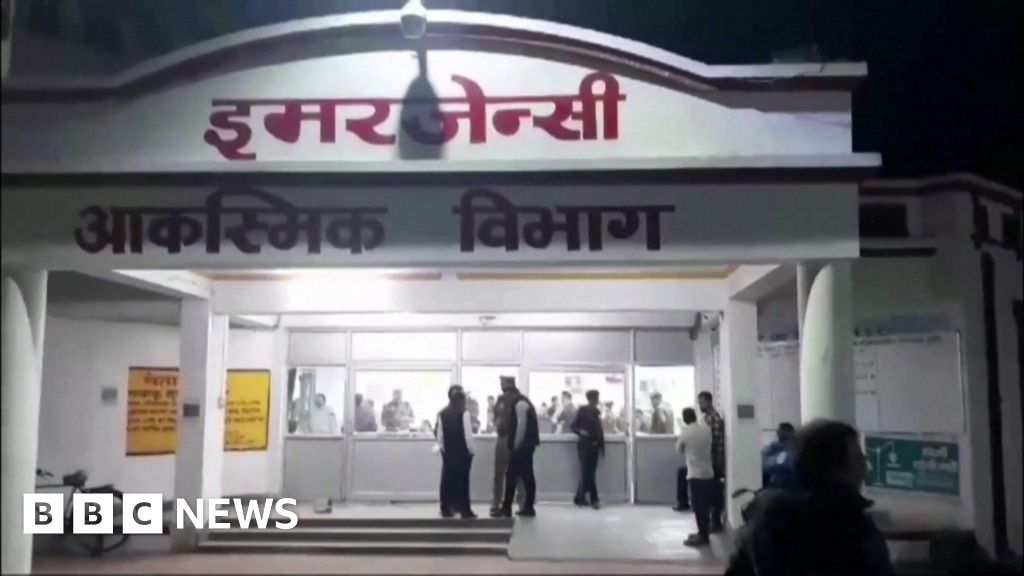ARTICLE AD BOX
Image source, Getty Images
Image caption,Rescuers search the Mayfield Consumer Products factory for survivors
When Kyanna Parsons-Perez was planning her 40th birthday celebrations, she'd never envisioned that it would take place as she lay trapped under the debris of a collapsed candle factory in Kentucky.
But a few hours before the end of her shift at the Mayfield Consumer Products plant on Friday night, Kyanna and her co-workers were told to take refuge in the factory's storm area.
What happened next will forever be etched in her memory.
"I didn't realise something was really, really wrong," she told the BBC. "But then I felt a gust of wind coming in and my ears started popping."
A mere seconds later, the building collapsed around her. The tornado had struck.
"Everything came down. There was a 'boom', and everything fell on us. There was a rocking back and forth. The lights went out," she said. "Then we were down."
Kyanna Parsons-Perez
The worst tornadoes ever to strike Kentucky were also some of the deadliest to spawn in the United States in recent memory. Days after they hit on 11 December, the victims are still being identified, many are still missing, and many more are displaced.
The Mayfield factory was among the places worst hit, with eight of 110 workers on duty Friday night confirmed dead and officials left scrambling to try account for everyone in the aftermath.
In the moment on Friday evening, Kyanna found herself trapped, pinned "awkwardly and uncomfortably" to the ground by the mangled remains of a water fountain.
Pinned beneath the metal, she called 911.
"That call did not sound reassuring, at all," she said. "I did not think we were going to get out of there anytime soon." She would spend the next three hours there before being rescued.
Around her, workers were frantic. Kyanna could hear some of them exclaiming "we're going to die" and panicking from the darkened rubble.
To find help, she tried an alternative - she began broadcasting live on Facebook, hoping that people in the area could come to their aid.
"I don't know who's watching," she said in the now-viral video, the sound of her terrified colleagues audible in the background. "Y'all please send us home help… pray for us."
Image source, Getty Images
Image caption,Much of the rubble of the factory had been cleared by Monday
To try to soothe those around her, Kyanna asked her colleagues to ring in her next year of life by singing "Happy Birthday" from the ruins.
"I just wanted to say whatever I could to keep myself calm, and keep everyone else calm," she said. "I guess I work well under pressure and have a high tolerance for pain. I've delivered four children."
Eventually, she was rescued relatively unscathed before walking "quite a ways" in the cold rain. She eventually found two friends.
"I hugged them and we cried a little," she said. "We were just glad to see each other."
Others in the factory were not so fortunate. Of the 110 workers on duty that night, eight were confirmed dead as of Tuesday.
Initially, officials feared that the death toll would be far higher, with early reports on Saturday suggesting that as many as 70 people were dead inside.
"If you saw it in person, you'd believe [that only eight dead] is a miracle," Governor Andy Beshear said on Tuesday. "The level of absolute destruction in one place, it's hard to describe."
Your device may not support this visualisation
Rescue personnel and company representatives later said that efforts to account for the workers were complicated after many walked away and were unreachable amid the devastation in the area, with landlines and cell phone towers collapsed.
Speaking to Fox News on Monday, company CEO Troy Propes said that staff chose not to evacuate workers earlier to avoid the risk of being caught outside by the storm.
"Everyone was aware of bad weather, but we're all taught, even as children, the first thing we do is don't get in your car," he said. "I believe more lives would have been lost. I know that ten minutes before [the tornado struck] they followed all protocols to get the employees, almost all the employees, to the designated area."
Kyanna disagreed. Safety concerns should have trumped the company's efforts to fulfil orders in a traditionally "hectic" period, she said.
"We shouldn't have been there. Given the warnings, they should have us go home, or not come in at all."
A company spokesperson did not respond to the BBC's request for comment.
Steve Powell, an extreme weather expert for Sedwick, a claims administrator, told the BBC that he believes little could have been done to mitigate risk in tornadoes as large as the ones that struck Kentucky.
"When you've got a tornado that has winds in excess of 200 mph, there are very few safe places to hide," he said.
In most cases, there is little more than a few minutes of warning about an impending tornado, Mr Powell said.
However, the tornadoes that struck Kentucky and several other states came after days of warnings about possible storms from local news stations and the National Weather Service.
Watch how Kentucky residents are rebuilding their lives from "hell on Earth"
Even so, Mr Powell said that options to mitigate the disaster would have been limited. "You still don't know the path of a tornado except for minutes before," he said. "There's almost nowhere safe to hide."
Kyanna, for her part, said she's too preoccupied with the aftermath to think much about what could have been done before the storm.
With the plant completely gone, she's been left without a job. Without a car, she's set up a GoFundMe to help fund transportation costs as she looks for work.
Her financial concerns are compounded by the trauma.
"As the adrenaline is coming down and reality sets in, I'm feeling a lot of stuff I can't really describe. I'm having a hard time," she said. "I'm just trying to put everything back together."
"It's a lot. I don't know what I'm going to do."

 2 years ago
64
2 years ago
64








 English (US)
English (US)